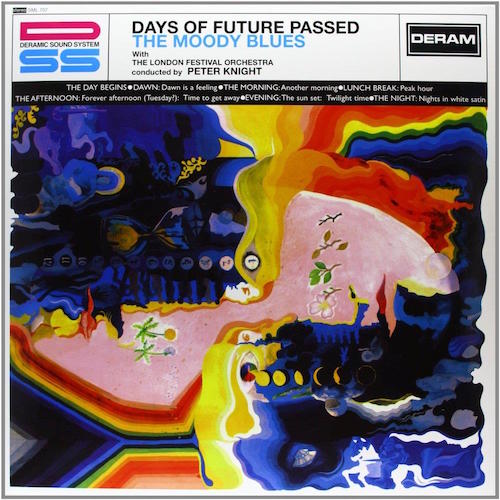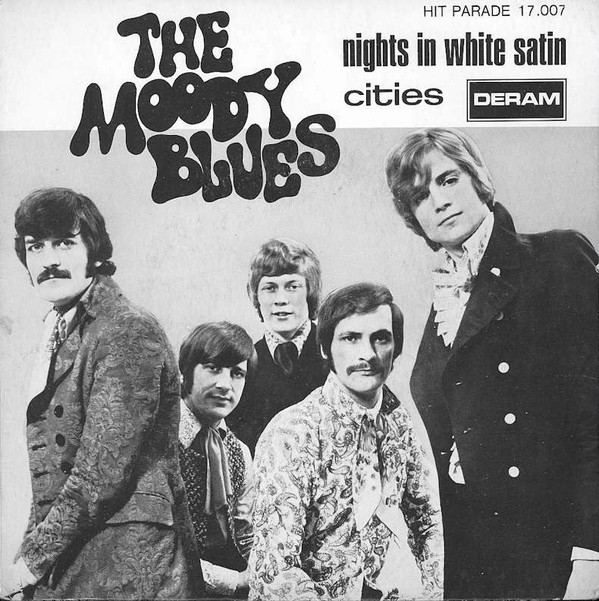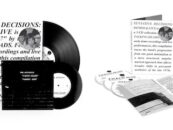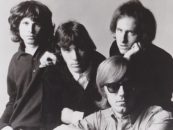There wasn’t a great deal of precedent, either within the group or on the pop music has landscape, for Days of Future Passed when The Moody Blues recorded their (sort-of) debut album. The British quintet had only just reinvented itself with a new lineup and a new sound, built in large part around the Mellotron, played by keyboardist and founding member Mike Pinder. That instrument—previously used so effectively on an influential handful of Beatles tracks (and intriguingly by Brian Jones on the Rolling Stones’ Their Satanic Majesties Request—finally afforded rock bands the ability to incorporate “classical”-type sonic textures in their music in a relatively practical fashion.
The hybrid rock/pop and classical (or at last classical-leaning) aesthetic of Days of Future Passed hadn’t been attempted by many significant artists prior to the Moodys’ effort. At roughly the same time that DOFP was being made, Love’s Forever Changes was being recorded more than 5,000 miles away. But the baroque textures of Love’s album, impressive though they would be, were far less ambitious than what the Moody Blues (along with producer Tony Clarke and conductor/composer Peter Knight) would achieve with Days of Future Passed.
Watch the Moody Blues perform “Tuesday Afternoon” in 1967
For the project, the band would supply 10 pop songs and a couple of brief poems; all five members had a hand in composing material for the album. Separately, Knight composed and arranged material for the fictitious London Festival Orchestra to play. His pieces provided the sonic linkage between the pop tracks; they would function as the glue that held the project together as a cohesive whole instead of a mere collection of top-notch songs.
The album opens with an exceedingly long fade-in of a struck gong; a full 30 seconds pass before Knight’s orchestra kicks in, the aural equivalent of time-lapse photography of a flower in bloom. “The Day Begins” provides a kind of overture for the album, folding in bits of the songs that are to follow. Knight teases out the signature melodic lines from a few of the pop songs—most notably the first and last of those, “Dawn is a Feeling” and “Nights in White Satin”—before leading the orchestra into a section redolent of parts of Tchaikovsky’s “Nutcracker Suite.” Knight’s lush orchestration is very much in a light-classical vein, and its accessible pop values set the scene for the band’s tunes.
Drummer Graeme Edge provides the band’s first offering on the disc, the poem “Morning Glory” (not credited or listed on the original LP sleeve). Wonderfully recited by Pinder, the spoken-word piece is serious and earnest, yet largely free of pretense. Regardless of how one feels about poetry in general, it’s near impossible to imagine Days of Future Passed without the spoken passages. And the strings that back Pinder’s recitation add just the right touch.
After another brief light-classical piece (“Dawn”), the Moody Blues make their first appearance on the record with “Dawn is a Feeling.” Justin Hayward’s romantic, yearning vocals are supported primarily by Pinder on piano and Mellotron; the rest of the band contributes in important yet subtle ways. Even though they were recorded separately, the band’s work and Knight’s orchestration come together seamlessly.
Related: Hayward sheds more light on the group’s masterpiece
Knight does an admirable job of creating orchestral melodies that lead into the group’s songs; one such piece introduces Ray Thomas’ loping “Another Morning.” The Moodys’ tune finally spotlights one of the band’s strongest assets: its soaring vocal harmonies. Thomas’ flute serves to erase, in the listener’s mind at least, the divide between band and orchestra.
Another Knight interlude, “Lunch Break,” one of his best efforts on the entire set, guides the listener into the midday part of the Moody Blues’ musical version of a typical day in the life of an Everyman. Bassist John Lodge’s kinetic “Peak Hour” is the hardest-rocking tune on Days of Future Passed, and points the way toward the group’s subsequent albums (all made without Knight and his orchestra). Along with some very expressive Mellotron work from Pinder and more glorious harmonies, Lodge’s underrated bass playing is a key asset of the song. Elsewhere, if only for a few seconds, Hayward provides one of the record’s few guitar solos. With the grandiose yet appropriate end of “Peak Hour,” the album’s first side concludes.
“Tuesday Afternoon” is one of the Moody Blues’ best-known and best-loved tunes, and it’s worn quite well over the last half-century. Owing in part to its enduring popularity, “Tuesday Afternoon” is perhaps the least dated track on the entire album. Hayward’s lead vocal soars while the band provides able, agile support. Once again, it’s Thomas’ flute work that leads into Knight’s beautiful orchestration.
John Lodge’s moody, minor-key “(Evening) Time to Get Away” adds a bit of grit and mystery to the album’s overall character. Hayward’s energetic acoustic guitar strumming and Pinder’s Mellotron lead into the ethereal vocal harmonies of the song’s chorus. Even as humble an instrument as Thomas’ tambourine is a key ingredient in the sound. And performed twice, the tune’s falsetto-sung bridge is as fine a bit of music as the Moodys would ever produce. Pinder’s Mellotron horns add a bit of extra texture.
And Pinder’s “Sunset” is easily the most exotic piece of music on Days of Future Passed. Unusual percussion, Thomas’ flute and Knight’s (real) strings come together to provide a backdrop for a front-and-center Pinder lead vocal. Nominally part of the same track, Thomas’ insistent “Twilight Time” provides a link to the Moodys’ earlier R&B/beat-group style, but once again Pinder’s Mellotron transports the song into the new style.
Related: Thomas (in his final interview) and Pinder remember Days of Future Passed
Watch John Lodge perform “Sunset” during the 2017 Moodys tour celebrating the album’s 50th anniversary
The romantic grandeur of “Nights in White Satin” signals the beginning of the end of Days of Future Passed. Lodge’s bass, Edge’s drumming and Hayward’s acoustic guitar are kept low in the mix, leaving sonic space for Hayward’s plaintive lead vocal. Pinder joins in on Mellotron, initially playing a single-note melody, eventually adding chord swells on the keyboard. The second verse features a Mellotron counter-melody intertwining with Hayward’s vocal. As the chorus approaches, the whole group provides stirring vocal harmonies. A descending bass figure followed by a single thump of Edge’s snare drum leads into a Ray Thomas flute solo. Other instruments are added to the mix during that solo.
For the next verse of “Night in White Satin,” Knight’s orchestra joins in, adding tonal color. The climactic chorus finds the orchestra once again in full flower, now alongside the group. A majestic orchestra restatement of the song’s signature melodic line dissolves into an arrangement full of anticipation. It is followed by an orchestral tune that evokes mental images of twinkling stars, just the right backdrop for Pinder’s reading of Edge’s “Late Lament.” After a final orchestral flourish, and a mighty strike upon of a gong, Days of Future Passed concludes.
Watch the original 1967 video for “Nights in White Satin”
Released on November 10, 1967, Days of Future Passed initially sold modestly in the U.K., reaching only #27, with “Nights in White Satin” climbing to #19. In the United States, however, it was a different story: The album rocketed all the way to #3 in Billboard, but “Nights in White Satin” stalled at #103, with “Tuesday Afternoon” faring better at #24. A full five years later though, with the Moody Blues now an established recording and concert act, “Nights…” was re-released and this time went all the way to #2. It has subsequently become a classic rock radio staple and has been inducted onto the Grammy Hall of Fame.
When Hayward, Lodge and Edge performed together in recent years, they didn’t dare leave the stage without performing the two hits from their 1967 landmark LP, and in 2017 they performed the entire album on tour in celebration of its 50th anniversary. A deluxe edition of the album was released that year, though it’s already out-of-print. Much of their catalog is available in the U.S./worldwide here, in Canada here and in the U.K. here.
Related: The Moody Blues at their long overdue Rock Hall induction








12 Comments so far
Jump into a conversationExcellent stuff Bill. To know the Moodies is to know some of the best music, and you do them justice. Thank you for this article. I wish I could write this good.
Thank you!
This album is in a category all is own. I feel in love with this gem as a child and still find it miraculous. Great article!
“Days of Future Passed” is a brilliant album and to me, the best the Moodies ever released. It is in my top 10 of favorites from the 60’s.
Thank you so much for exploring this album in depth. It is SO well worth the listen.
John Lodge, front and center on “Sunset”. Not Pinder
To clarify: the album was released in the US in March, 1968 (BB, CB, RW ads).
It entered the Billboard Album Chart on 5/11 and after 22 weeks topped out at #27 on 10/12. It fell off the charts on 1/25/69.
It did reach #3 on 10/28/72 after being reissued.
An incredible album from the first band I totally fell in love with. Tuesday Afternoon will always be one of my top 5 Moodies songs. I did want to comment about The Sunset though. That’s Mike Pinder’s composition, Mike on lead vocals and Mike playing Mellotron throughout the song. Knight’s (real) strings don’t come in until the last note of Mellotron is played. And when you think about it, the Mellotron is real strings!!
It’s NIGHTS not KNIGHTS….55 years and people get it wrong still. Talking about SHEETS!! Not Knights and Shining Armor!! LOL
Not sure we follow you, lablue. The repeated references to Knight are for the orchestra conductor.
TUESDAY AFTERNOON is my favourite Moody Blues song. And will remain so.
The rest of the album is still great after all these years. Well worth another listen!
RE UK DP original 1967 pressings vs. the US pressings, I have recognized about 10 differences (longer and/or shorter song or verse or fadeouts discovered when visiting UK friends who played their LPs.(“say WHAA>?”) plus international variat8ons of both back and front cover headings, photos, unlisted song titles (Overture, Morning Glory, Evening/Time to Get Away, Late Lament, Resolvment,; but also missing individual recording lengths which were added to back cover on later issues. Still, DFP is forever a timeless achievement.
I don’t know how you can make a better album than this. It’s perfect from start to finish. Tuesday Afternoon may be the greatest song ever written